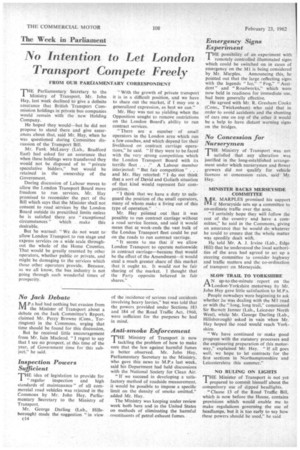No Intention to Let London Transport Compete Freely
Page 54

If you've noticed an error in this article please click here to report it so we can fix it.
FROM OUR PARLIAMENTARY CORRESPONDENT
THE Parliamentary Secretary to e th Ministry of Transport, Mr. John Hay, last week declined to give a definite assurance that British Transport Commission holdings in private bus companies would remain with the new Holding Company.
He hoped they would—but he did not propose to stand there and give assurances about that, said Mr. Hay, when he was questioned during Committee discussion of the Transport Bill.
Mr. Fank McLeavy (Lab., Bradford East) had asked for an assurance that when these holdings were transferred they would not be disposed of to "private speculative bidders," but would be retained in the ownership of the Government.
During discussion of Labour moves to allow the London Transport Board more freedom to run services, Mr. Hay promised to reconsider the part of the Bill which says that the Minister shall not consent to road services by the London Board outside its prescribed limits unless he is satisfied there are "exceptional circumstances" which make this desirable.
But he warned: "We do not want to allow London Transport to run stage and express services on a wide scale throughout the whole of the Home Counties. That would be greatly resented by other operators, whether public or private, and might be damaging to the services which those other operators provide. Because, as we all know, the bus industry is not going through such wonderful times of prosperity. "With the growth of private transport it is in a difficult position, and we have to share out the market, if I may use a generalized expression, as best we can."
Mr. Hay was not so yielding when the Opposition sought to remove restrictions on the London Board's ability to run contract services. •
"There are a number of small operators in the London area which run a few coaches, and which depend for their livelihood on contract carriage operations," he said. "If they were to be faced with the very strong competition which the London Transport Board with its terrific fleet . . ." A Labour member interjected: " But fair competition and Mr. Hay retorted: "I do not think that a sort of David and Goliath situation of that kind would represent fair competition.
"1 think that we have a duty to safeguard the position of the small operators, many of whom make a living out of this type of operation."
Mr. Hay pointed out that it was possible to run contract carriage without a road service licence, and said it would mean that at week-ends the vast bulk of the London Transport fleet could be put on the roads to run contract carriage.
"it seems to me that if we allow London Transport to operate nationwide in contract carriage—because that would be the effect of the Amendment—it would steal a much greater share of this market that it ought to. It would not be fair sharing of the market. I thought that the Party opposite believed in fair shares."












































































































































































